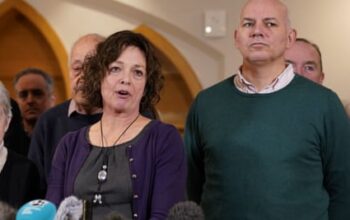Keir Starmer has said the government will step in to support key British industries, as business grapples with the economic turmoil unleashed by Donald Trump’s global tariffs.
As the government attempts to counter the impact of the White House hitting the UK with a 10% base levy on exports to the US, the prime minister will promise to help shelter vulnerable sectors and will implement key parts of the industrial strategy months early.
In his first significant intervention since the US ushered in a new economic era last week, Starmer will announce plans to give carmakers more flexibility over how they meet a target to stop sales of new petrol and diesel cars by 2030.
Smaller manufacturers such as Aston Martin will be exempt from the target while the sale of hybrid cars will continue until 2035 to give industry more time to prepare for the shift to electric vehicles, a growth sector for the UK.
Other sectors to be hit by Trump’s tariffs are expected to receive support later in the week, with life sciences likely to be among them. Ministers will announce measures designed to stimulate growth, such as cutting red tape and removing more planning restrictions.
“Global trade is being transformed so we must go further and faster in reshaping our economy and our country through our plan for change,” Starmer will say in a speech in the West Midlands on Monday. “I am determined to back British brilliance. Now more than ever UK businesses and working people need a government that steps up, not stands aside. That means action, not words.”
Almost $5tn (£3.9tn) was wiped off the value of global stock markets after Trump launched his tariff offensive last Wednesday on the rest of the world, including the 10% base duty on imports into the US from the UK and 20% on goods from the EU, Britain’s largest trading partner.

Starmer spent the weekend at Chequers making calls to other world leaders including the European Commission president, Ursula von der Leyen, the incoming German chancellor. Friedrich Merz, and the French president, Emmanuel Macron, during which the prime minister reiterated his disappointment at the tariffs.
A No 10 spokesperson said: “He updated on his plans to go further and faster to strengthen the UK’s economy and ensure it is as resilient as possible and can withstand these kinds of global shocks. He added that it would be important for the UK to strengthen its trading relationships with others across the globe at the same time.”
Ministers hope that talks will restart between US and UK officials on a trade deal, which could result in a lowering of tariffs, although senior MPs have cautioned the government not to give too much ground to Washington.
The government is also pressing on with talks for trade deals with other countries including India and China.
In the meantime, ministers hope to give British automotive brands such as Rolls-Royce, Vauxhall and Land Rover a degree of stability amid turbulent times. The zero-emission vehicle (ZEV) mandate will be changed to make it easier for industry to upgrade to make electric vehicles.
It comes after Jaguar Land Rover’s announcement that it is pausing shipments of its UK-made cars to the US for a month as it considers how to mitigate the cost of Trump’s tariffs. The 25% tariff imposed by the US on imported cars and light trucks took effect on 3 April.
after newsletter promotion

After declaring at the weekend that Trump’s actions had ushered in a new global economic era, Starmer is now rethinking key elements of the government’s economic strategy.
However, experts say his plans are unlikely to fill a new “black hole” in the autumn budget, increasing pressure on the chancellor, Rachel Reeves, to make further spending cuts or increase taxes to balance the nation’s books.
There is also speculation Starmer and Reeves could even change their “iron clad” fiscal rules to allow more borrowing to increase economic growth at home in the event of recession, although Treasury insiders have insisted such a plan is “for the birds”.
Darren Jones, the chief secretary to the Treasury, said the impacts on the global economy unleashed by the US would severely affect the UK economy and that there was little the government could do about it.
However, he told BBC One’s Sunday with Laura Kuenssberg programme: “What we can do is go further and faster on our plan for change here at home in the UK … On the UK economy, we’re trying to get ahead of these challenges.”
Ministers would be working “hand in glove” with business to make the economy as resilient as possible, Jones continued. “The world has changed. We knew that already on security and defence. It’s now true on global trade, and that’s why we have to go further and faster in investing in the economy and supporting businesses.”
He told Sky News that the lower 10% rate facing the UK was a “Brexit dividend”, when the EU had been hit with a 20% tariff, adding: “I’ve struggled to find one in the past but there is one we’ve ended up with.”
Amid concerns that online safety laws could be watered down as part of a trade deal with the US, Jones said the “basic protections” of the plans were “not up for negotiation”, adding that the government would not “be walking away from” the idea that digital platforms needed to protect children from harm.
Source: theguardian.com


